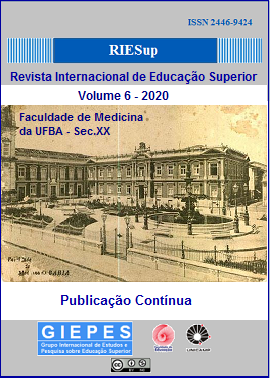Abstract
This article is the result of a project developed in the the Instituto Federal de Educação, Ciência e Tecnologia do Ceará (IFCE) - Campus Cedro called "ComputerizAction" that materializes with the offer of a specific course for the female public in the area of basic informatics and also the digital inclusion of these women. The target audience of the course are women over the age of 40, who are in a time of digital vulnerability and who reside in the city of Cedro-CE. This research aims to understand how the use of drawings - in a process of content abstraction in the subject of Informatics - can help in the teaching of learning of the women participating in the extension course. The present work analyzed the activity of students of the Information Systems (IS) course of the IFCE - Campus Cedro, during the inaugural class of the basic computer science course. In this work, the non-participant observation technique was used.
References
ADALBERTO, Edeli Machado l. Movimento makers e a aprendizagem criativa no ensino da matemática no fundamental I. In: ENCONTRO NACIONAL DE EDUCAÇÃO MATEMÁTICA, 12, 2016, São Paulo. Anais... . São Paulo: Sociedade Brasileira de Educação Matemática, 2016. v. 12, p. 1 - 8. Disponível em: http://www.sbem.com.br/enem2016/anais/pdf/8040_3907_ID.pdf. Acesso em: 10 set. 2017.
BALIEIRO, Keline. Morais. COSME, Luciana Balieiro; SILVA, Alana Mendes. CANGUSSU, Amanda Chaves Moreira & COSME, Luana Balieiro. Perfil do público-alvo do projeto de inclusão digital de mulheres. In: CONGRESSO NACIONAL DE EDUCAÇÃO, 12., 2015, Montes Carlos. Anais... . Curitiba: Educare, 2015 p.4632 - 4640. Disponível em: http://educere.bruc.com.br/arquivo/pdf2015/21673_11500.pdf. Acessado em: 01 de Nov. 2017.
BEINEKE, V. Aprendizagem criativa e educação musical: trajetórias de pesquisa e perspectivas educacionais. Educação, Santa Maria, v.37, p.45-60, 2012. Disponível em: https://periodicos.ufsm.br/reveducacao/article/view/3763/2710. Acessado em: 30 de Agosto de 2017.
BERGMANN, J. & SAMS, A. Sala de Aula Invertida - Uma metodologia Ativa de Aprendizagem. Rio de Janeiro: LTC, 2012.
BOSSA, Nadia. A. Dificuldades de aprendizagem: O que são? Como tratá-las? 1 Edição. Reimpressão/2007. São Paulo/ SP, 2000.
BORGES, L. P. C. Reflexões necessárias sobre a educação de jovens e adultos: perspectivas, desafios e possibilidades. Espaço do Currículo, v.2, n.1, p.137-155, MarçoSetembro/2009.
FAVA, Fabricio Mário. Maia. Fluke Repensando a gamificação para a aprendizagem criativa. 2016. 162 f. Tese (Doutorado) - Curso de Pós-graduados em Comunicação e Semiótica, Faculdade de Filosofia, Comunicação, Letras e Artes, Pontifícia Universidade Católica de São Paulo, São Paulo, 2016. Disponível em: https://sapientia.pucsp.br/handle/handle/19186. Acesso em: 20 set. 2017.
MARCONI, M. A. & LAKATOS, E. M. Fundamentos de metodologia científica. 8 ed. São Paulo: Atlas, 2017. MITJANS MARTÍNEZ, M. A. A criatividade como principio funcional da aula. En I. P. A. Veiga (Coord.), Aula: Gênese, Dimensões, princípios e práticas, p. 115–143. Campinas, Brasil: Papirus, 2008.
MITJANS MARTINEZ, Albertina. Creative learning: Challenges for pedagogical practice. CS, Cali , Brasil, n. 11, p. 311-341, jun./2013. Disponível em: http://www.scielo.org.co/scielo.php?script=sci_arttext&pid=S2011- 03242013000100011&lng=en&nrm=iso. Acesso em: 5 ago. 2019.
PAIVA, M. R. F. PARENTE, J. R. F. BRANDÃO, I. R. & QUEIROZ, A. H. B. Metodologias ativas de ensino-aprendizagem: revisão integrativa. Sobral: SANARE, Ceará, v. 15, n. 02, p. 145-153. 2016. Disponível em: https://sanare.emnuvens.com.br/sanare/article/view/1049. Acessado em: 20 de set. 2017.
ZENI, J. ANTUNES, I. GATTI, I. & OLIVEIRA, M. A. Inclusão digital – informática terceira idade. SEMINÁRIO DE EXTENSÃO UNIVERSITÁRIA DA REGIÃO SUL, 31. 2013. Anais... . Disponível em: https://repositorio.ufsc.br/bitstream/handle/123456789/116872/Educa%C3%A7%C3%A3o%20%20INCLUS%C3%83O%20DIGITAL%20%E2%80%93%20INFORM%C3%81TICA%20TERCEIRA%20IDADE%20%281%29.pdf?sequence=1&isAllowed=yAcessado em: 20 de Novembro de 2017.
A Revista Internacional de Educação Superior utiliza a licença do Creative Commons (CC), preservando assim, a integridade dos artigos em ambiente de acesso aberto.


